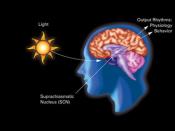Biological rhythms are controlled by endogenous pacemakers otherwise known as internal time keepers which are found in the hypothalamus and are maintained even without the input of external cues. They are especially important as they monitor the passing of time. Many researchers agree that endogenous pacemakers are near certainly genetically-inherited and are able to free-run when exogenous zeitgebers are not present. Human embryos which have had no exposure to external cues support this argument. It is more beneficial for survival, however if oneÃÂs endogenous pacemaker is fine-tuned into the exogenous zeitgeber as that would ensure that one is in ÃÂlocal timeÃÂ. They are vital in ensuring the survival of many creatures; beach-living algae for instance, have been found to tunnel into the sand during high tide and re-emerge when the tide is low. This enables the algae to stay alive, as it would otherwise die. This strongly suggests how important endogenous pacemakers are in terms of survival.
Infact biological rhythms have been identified in each of the animals and insects which have been studied including hamsters, fruit flies and molluscs.
Endogenous pacemakers are able to be fine-tuned by environmental cues of which the main known one is light; however others include temperature, food availability and social cues. Research involving the transplants of mutant SCNs in hamsters has shown that the supra-chiasmatic nuclei is an endogenous pacemaker. Hamsters were implanted with a mutant SCN from hamsters with a shorter biological cycle and their cycles changes to fit the new cycle of their SCN. The main exogenous zeitgeber, light, is the most important as it effects the sleep/wake cycle, migration, moulting and hibernation yet in the case of the latter there is some evidence that food availability may also have an important role.
Organisms have a number of biological rhythms such as...


